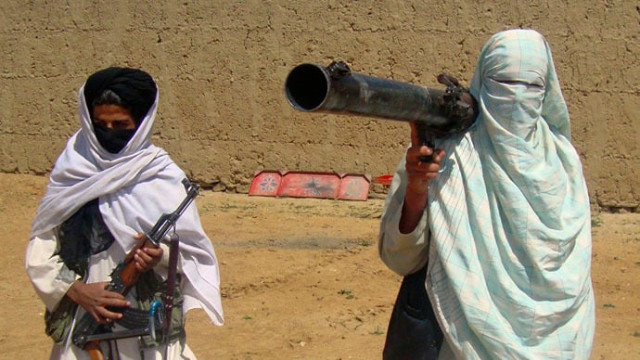Spring offensive Azm sets alarm bells ringing across Afghanistan
Local forces seek assistances from international forces.

The Afghan media’s claim that Taliban insurgents are only two kilometres away from Kabul has sent alarm bells ringing. PHOTO: REUTERS
During his maiden visit to India, President Ashraf Ghani reiterated his commitment to engage in peace talks and threw his weight behind the Taliban’s right to be part of Afghanistan’s political system. However, the Taliban are unwilling to find a common ground and are adamant to pursue their war. They have also extended the epicentre of their fight from their traditional stronghold in the south to the northern parts of the country.
Meanwhile, the Afghan media’s claim that Taliban insurgents are only two kilometres away from Kabul has sent alarm bells ringing.
Spate of violence
According to Afghan officials, reinforcements have been sent to the area to drive out the Taliban and they have managed to curb insurgency in some areas. However, these claims have been vehemently rejected by the Taliban.
Speaking to The Express Tribune on Friday, Taliban spokesman Zabihullah Mujahid has voiced the group’s intention to take the offensive to other parts of the country.
“Kunduz is just the beginning,” he said. “Fighting in Kunduz does not mean we will not focus on the east and the south. We will deal a critical blow to our enemies across the country.”
According to Mujahid, the spring offensive is in its initial stages and will generate the desired impact.
“Our operations are making progress in Kunduz,” he said. “We are consolidating positions in areas which we have captured over the past six days.”
International support
At this critical juncture, violence and uncertainty have become the order of the day and the country is seeking assistance to quell these threats.
Although the US and Nato forces decided to wrap up their combat role on December 31, 2014, Kunduz governor Mohammad Omar Safi has said ISAF provided “air support” during the latest offensive. Similarly, Afghan Interior spokesperson Siddiq Sidqiqi has also hinted at the need to seek assistance from international forces to confront the Taliban.
Speaking to Tolo TV earlier this week, Siddiqi said Afghan forces predominantly focused on clean-up operations and might need help from international players to ensure stability.
Earlier this week, General Wilson Schoffner, a senior Nato official, said coalition forces are willing to provide support to Afghan forces if it is required. However, he maintained, the Afghan forces have dealt with the matter in an appropriate manner.
Afghan defence ministry’s spokesman Daulat Waziri told Tolo TV 14 operations have been launched while a series of other combat actions are in the pipeline.
Regional impact
Some weeks before the Kunduz operation was launched, the Taliban had attacked security posts in Badakhshan province, killing dozens of security personnel.
Since the province borders Tajikistan, the offensive had heightened concerns about possible instability in Kunduz and the Central Asian states. This is likely to have ramifications on the entire region.
Relations between the Central Asian states and Afghanistan may hit rock bottom and trigger uncertainty. The former believe their armed opponents operate from northern parts of Afghanistan. On the other hand, Afghan officials claim militants from the Central Asian states and Chechnya are hand-in-glove with the Taliban. Faced with a mixture of doubt and uncertainty, the situation is likely to spiral out of control.
Similarly, China may also bear the brunt of violence as it shares a 76-kilometre- long border with northern Afghanistan.
Pakistan is also concerned about the increase in violence in Afghan at a time when the Taliban have rejected overtures for an intra-Afghan dialogue.
During her weekly briefings, foreign ministry spokesperson Tasnim Aslam claims Pakistan has already condemned the recent spike in violence in Afghanistan and is in favour of a reconciliation process.
Published in The Express Tribune, May 2nd, 2015.












COMMENTS
Comments are moderated and generally will be posted if they are on-topic and not abusive.
For more information, please see our Comments FAQ